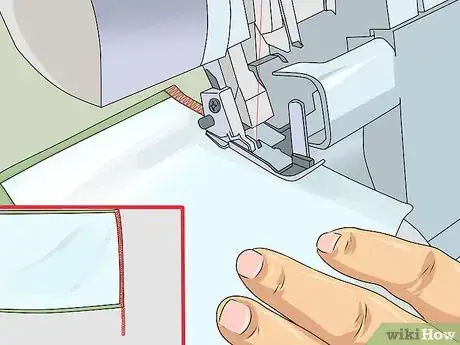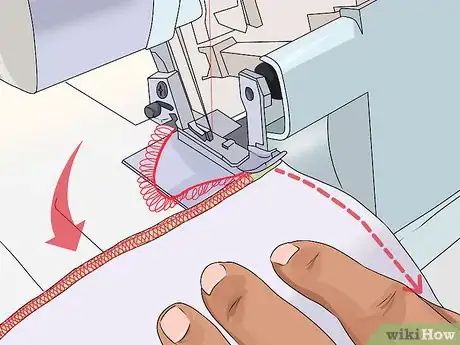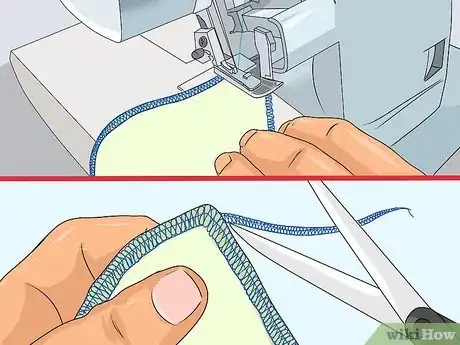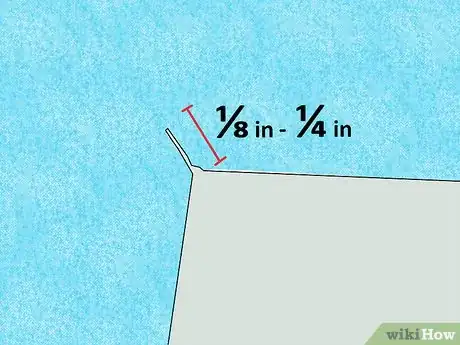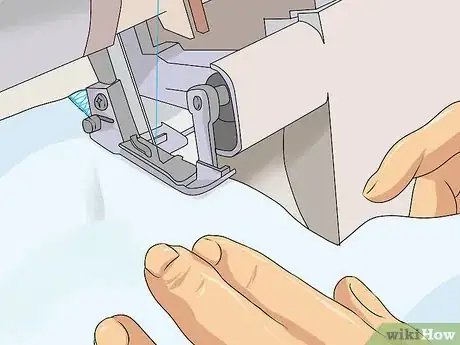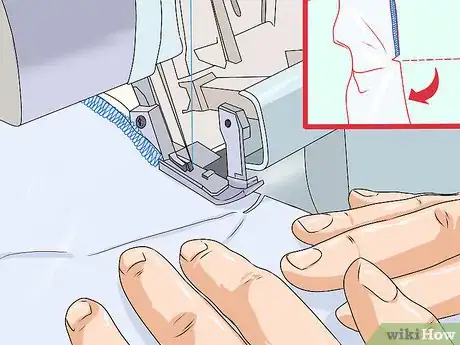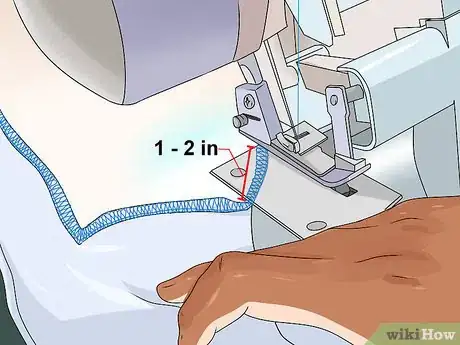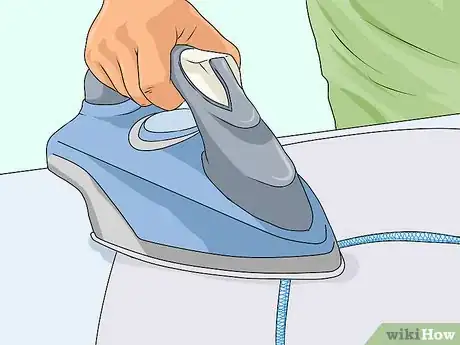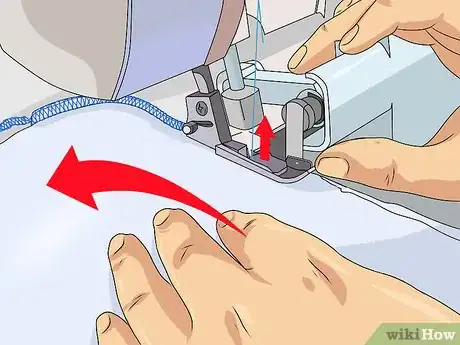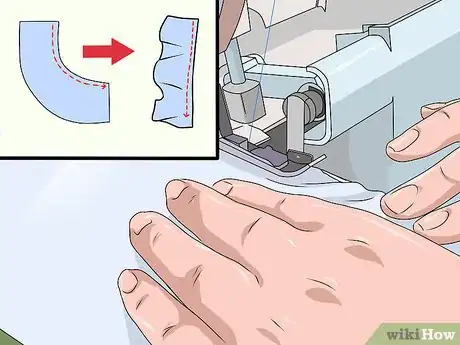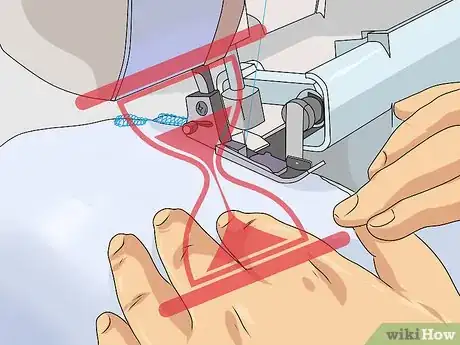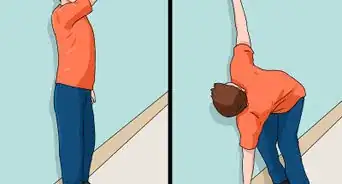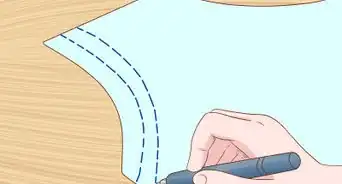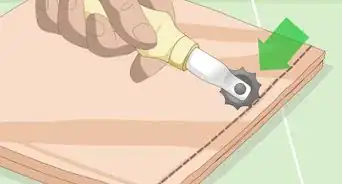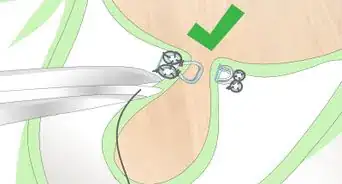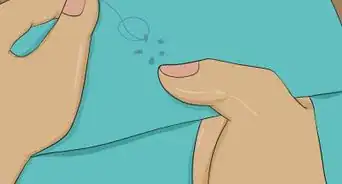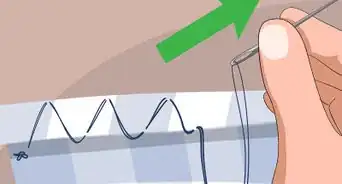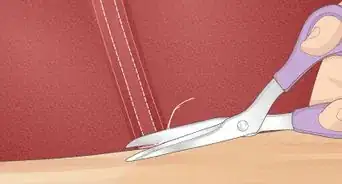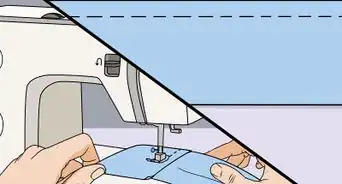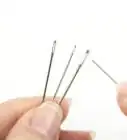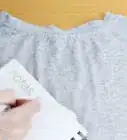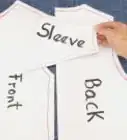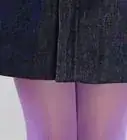This article was co-authored by Alessio Iadicicco. Alessio Iadicicco is an Apparel Manufacturing Specialist and the CEO and Co-Founder of MarkersValley, an online apparel and manufacturer sourcing platform that connects luxury fashion brands to a network of highly-vetted, truly Italian manufacturers. He holds a Bachelor's degree in Economy and Management of Financial Enterprises from The University of Naples Federico II. MarkersValley has connected fashion brands in over 100 countries and has a network of over 100 independent Italian factories and artisans. MarkersValley has been featured in Forbes, EQ, St. Louis Business Journal, Il Mattino, and Corriere Della Sera.
There are 8 references cited in this article, which can be found at the bottom of the page.
This article has been viewed 19,364 times.
Serging fabric produces secure edges without no hemming necessary. However, serging around corners can be tricky. Whether you want to serge an outside corner, an inside corner, or a curved edge, there are some things you can do to make your work easier.
Steps
Serging Around an Outside Corner
-
1Serge down the first side and past the corner. Begin by serging in a straight line down the first edge of your material. Don’t stop when you reach the corner. Keep serging and go an inch or two past the end of the material and then stop the machine.[1]
- By going past the end, you can serge over the excess stitches and this will secure them in place.
-
2Turn the fabric and continue serging. After you stop the machine, turn the fabric so that the next edge is lined up with your serger needle. Start serging just before the corner of the material. Serge to the end of this edge and go past it as you did with the last one.[2]
- Continue to serge down edges and go past the edge each time. Turn the fabric each time you start on a new edge.
Advertisement -
3Finish by serging over the tail. After you have serged all of your corners, go past the edge and cut the tail so that it is about an inch long. Then, lay this tail over the corner nearest to it and serge over the tail and off to the side of the material. Then, snip off the new tail.[3]
Serging Around an Inside Corner
-
1
-
2Serge down the first edge. When you are ready to start serging, start at the top of the material. Then, serge straight down the edge towards the corner. As you approach the corner, slow down. You will need to straighten the fabric and serge over the corner slowly.[8]
-
3Straighten the corner. Just before you reach the corner, pull the edges apart to straighten out the corner.[9] Then, continue serging over the corner and turn the fabric slightly as you transition to the new edge.
-
4Continue serging to the end. Serge to the bottom of the new edge and go past it by about an inch or two. This will leave a tail that you can sew back into the fabric, or sew over it as you go around an outside corner.
-
5Iron out any wrinkles in the corner after you are done. There may be a few wrinkles in the fabric after you serge over the corner. However, you can simply iron the fabric to get these wrinkles out.[12]
Serging Around Curved Edges
-
1Lift the presser foot for an outside curve. To move the fabric in a curving fashion, you will need to release the pressure on your fabric. By lifting up the presser foot and using your fingers to guide the fabric along, you will be able to serge around the outside curve.[13]
- You may want to just lift the presser foot for the sharpest portion of the curve and then lower the foot back down when you get past this part.
- Watch your fingers when you have the presser foot up! Keep them well away from the needle.
-
2Straighten out the fabric for an inside curve. If the curve is on the inside of your material, then straightening out the fabric may be your best option. Tug on both sides of the fabric to straighten it out and then serge in a straight line down the edge.[14]
-
3Go slow. No matter what kind of curve you are serging, going slow will probably improve your results. Take your time and stop the machine if anything starts to bunch up.[15]
Expert Q&A
-
QuestionCan you sew on a curve with a serger?
 Alessio IadiciccoAlessio Iadicicco is an Apparel Manufacturing Specialist and the CEO and Co-Founder of MarkersValley, an online apparel and manufacturer sourcing platform that connects luxury fashion brands to a network of highly-vetted, truly Italian manufacturers. He holds a Bachelor's degree in Economy and Management of Financial Enterprises from The University of Naples Federico II. MarkersValley has connected fashion brands in over 100 countries and has a network of over 100 independent Italian factories and artisans. MarkersValley has been featured in Forbes, EQ, St. Louis Business Journal, Il Mattino, and Corriere Della Sera.
Alessio IadiciccoAlessio Iadicicco is an Apparel Manufacturing Specialist and the CEO and Co-Founder of MarkersValley, an online apparel and manufacturer sourcing platform that connects luxury fashion brands to a network of highly-vetted, truly Italian manufacturers. He holds a Bachelor's degree in Economy and Management of Financial Enterprises from The University of Naples Federico II. MarkersValley has connected fashion brands in over 100 countries and has a network of over 100 independent Italian factories and artisans. MarkersValley has been featured in Forbes, EQ, St. Louis Business Journal, Il Mattino, and Corriere Della Sera.
Apparel Manufacturing Specialist Yes, you can. It's simple, actually. Make the “L” seam, trim the corner of the seam, then make a small cut in the tip. With the help of a crochet hook or a safety pin, make the tip come out perfectly.
Yes, you can. It's simple, actually. Make the “L” seam, trim the corner of the seam, then make a small cut in the tip. With the help of a crochet hook or a safety pin, make the tip come out perfectly.
References
- ↑ https://www.threadsmagazine.com/2013/01/24/four-serging-techniques
- ↑ https://www.youtube.com/watch?v=na9Ns2LPtHc
- ↑ https://www.youtube.com/watch?v=na9Ns2LPtHc
- ↑ Alessio Iadicicco. Apparel Manufacturing Specialist. Expert Interview. 20 May 2021.
- ↑ https://www.youtube.com/watch?v=W6OVFqgb-S8
- ↑ http://www.happymamatales.com/serging-corners/
- ↑ https://www.threadsmagazine.com/2013/01/24/four-serging-techniques
- ↑ https://www.youtube.com/watch?v=W6OVFqgb-S8
- ↑ https://www.threadsmagazine.com/2013/01/24/four-serging-techniques
- ↑ Alessio Iadicicco. Apparel Manufacturing Specialist. Expert Interview. 20 May 2021.
- ↑ http://weallsew.com/how-to-pivot-around-an-inside-corner-with-your-overlockerserger/
- ↑ https://www.youtube.com/watch?v=W6OVFqgb-S8
- ↑ https://www.threadsmagazine.com/2013/01/24/four-serging-techniques
- ↑ https://www.threadsmagazine.com/2013/01/24/four-serging-techniques
- ↑ http://www.makeithandmade.com/2012/08/how-to-serge-curves.html
